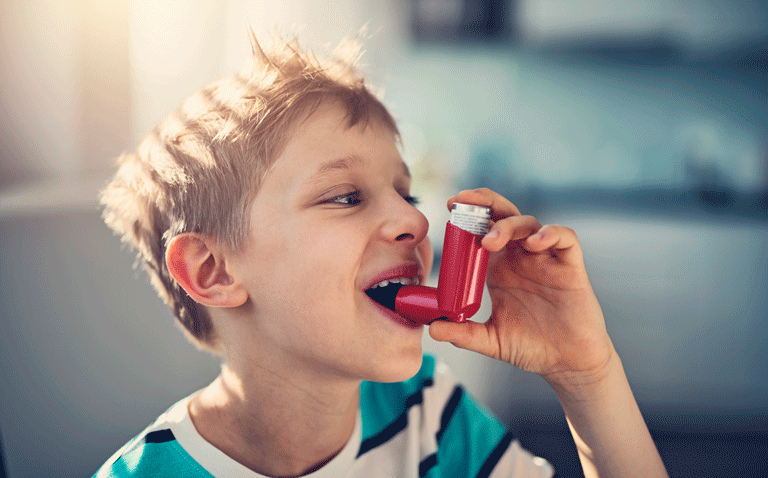Add-on dupilumab therapy for children with uncontrolled moderate-to-severe asthma led to a significant reduction in disease exacerbations
Add-on dupilumab treatment in children with uncontrolled moderate-to-severe asthma produced a significant reduction in the number of exacerbations over a 52-week period, according to results of a Phase III, randomised, double-blind, placebo-controlled trial by researchers from the Division of Allergy, Immunology, and Pulmonary Medicine, Monroe Carell Jr. Children’s Hospital Nashville, US.
The global prevalence of asthma in children varies across the world with an estimated 10.8% of 6–7-year-old children having the disease although rates are lower rates in Northern and Eastern Europe (4.5%) but much higher in North America (20.0%) and Oceania (29.2%). While there are differences in the definition of ‘severe’ asthma, it has been suggested that prevalence of severe childhood asthma may be up to 5% and there is more concerning evidence indicating that childhood asthma increases the risk of COPD in adults.
Asthma appears, in part, to be a Th2-driven inflammatory process, characterised by the release of the cytokines interleukin (IL)-4, IL-5 and IL-13 and higher levels of Th2 inflammation are associated with greater airway hyper-responsiveness and more severe disease though only around 50% of patients have this endotype. The monoclonal antibody, dupilumab, blocks the action of IL-4 and IL-13 and has been approved for the treatment of adults and adolescents with asthma.
In Europe, the EMA has approved add-on dupilumab (brand name Dupixent) to ‘treat severe asthma in patients aged 12 years or over whose asthma is not properly controlled by a combination of high-dose corticosteroids taken by inhalation plus another medicine used for the prevention of asthma. Dupixent is only for use in patients with a type of inflammation of the airways called ‘type 2 inflammation’.
For the present study, the US team recruited children aged 6 to 11 years with physician diagnosed moderate-to-severe asthma. Children were defined as those with type 2 inflammatory asthma phenotype defined by an eosinophil count of > 150 cells/cubic/ml or at least 300 cells/cubic/ml at baseline.
These children were randomised 2:1 to receive subcutaneous dupilumab (or matching placebo) every two weeks for 52 weeks at a dose of 100 mg (if their weight was <30 kg) or 200 mg (if weighing >30 kg). The primary endpoint was the annualised rate of severe exacerbations during the treatment period, defined as a deterioration of asthma control requiring systemic glucocorticoids for at least 3 days, hospitalisation or an emergency department visit that resulted in systemic glucocorticoid use. A key secondary outcome was the change from baseline to week 12 in the percentage of predicted prebronchodilator FEV1 (ppFEV1).
Findings
A total of 408 children with type 2 inflammatory asthma and a mean age of 8.9 years (66.4% male) were randomised to add-on dupilumab therapy or placebo. Among these children, 43% used high-dose inhaled glucocorticoids and had an average of 2.2 severe asthma exacerbations in the past year. An additional 259 children with an eosinophil count > 300 were similarly matched to dupilumab and placebo.
In the type 2 inflammation group, the adjusted annualised rate of severe asthma exacerbations was 0.31 (95% CI 0.22 – 0.42) in the add-on dupilumab group and 0.75 (95% CI 0.54 – 1.03) in the placebo group, giving a relative risk reduction, RR of 59.3% (p < 0.001). Similarly, among those with eosinophil counts > 300, the adjusted annualised rate of severe exacerbations was 0.24 (dupilumab) and 0.67 (placebo).
Overall, the percentage of participants who had no exacerbations during the 52-week study period was 77.1% in the dupilumab group and 59.6% in the placebo group and 79% vs 58.3% in the eosinophil vs placebo groups.
The changes in ppFEV1 were also significantly better for those in the add-on dupilumab group for both asthma phenotypes.
The authors concluded that dupilumab led to a meaningful improvement through asthma exacerbations and improvements in lung function in 6 to 11 year olds with moderate-to-severe asthma.
Citation
Bacharier LB et al. Dupilumab in Children with Uncontrolled Moderate-to-Severe Asthma. N Engl J Med 2021










